An Examen for White Allies
BY MADDIE MURPHY | June 3, 2020
It is no secret that racism is a long-lasting and dangerous major sin and violence within American society. Unspeakable actions that negatively and systematically impact people of color persist in our society—the racial violence leading to the murders of black individuals, the continued destruction of Indigenous lands, the separation and marginalization of families and individuals seeking asylum at our border. It has felt spiritually overwhelming to be faced with the racism that some of us may have convinced ourselves was long gone. It is challenging to recognize that while progress has been made in this country, we are nowhere near being a just, or even safe, country for people of color.
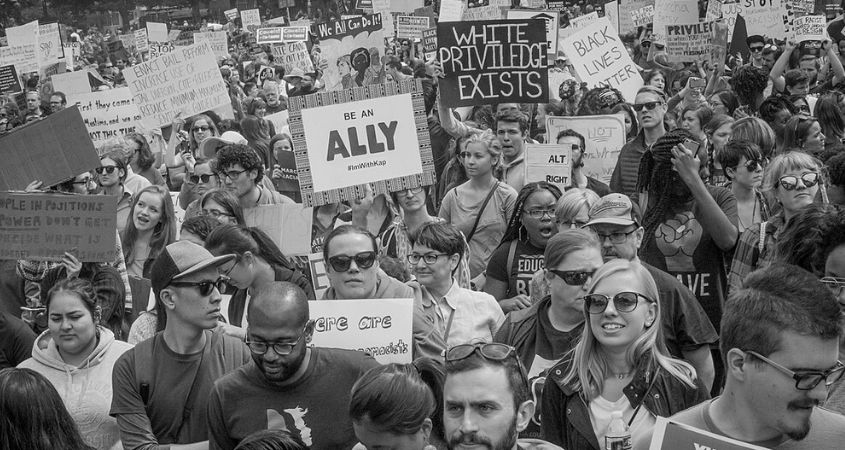
[Image: March for Racial Justice, Washington, D.C. September 30, 2017, photo by Philip N. Cohen from photo essay, “It’s Better to be Angry Together,” via Wikimedia]
I can find ways in which I have used my power, privilege, and resources to benefit and support my clients of color, just as I can shamefully find ways in which I have ignored or abused my privilege. I am not proud of these moments. Although it would be easier for me to ignore them and move on, part of being a racial ally is in the presence and awareness and self-education of these moments. Truly, reflecting on my actions and how I take from and make space for people of color is an incredibly Ignatian thing to do.
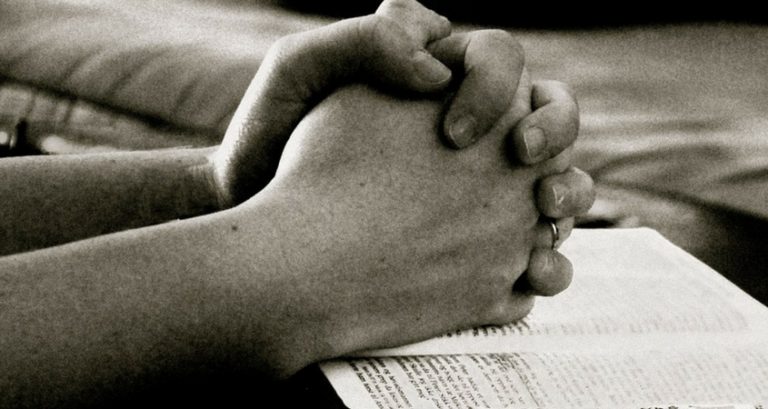
Ignatian spirituality invites us to become contemplatives in action, an invitation for us to view the way in which we can be in this world. It asks us to be aware not only of the world around us, but how we move, act, and love within it. Being an ally for racial justice asks us to do the very same thing—that is, to reflect and be aware of the systemic racial oppression our society is built upon, and on how we not only benefit from it, but on how we can use our power and privilege to dismantle it and support people of color. In short, it asks us to be present and put in the work.
It is not only civilly important for me, but morally and spiritually imperative that I reflect on the ways my whiteness supports or challenges racism—in my daily thoughts, words, and actions. Thus, I have reworked the traditional Ignatian Examen to be used as a tool for white folks hoping to act as racial allies. A common version of the Examen is as follows:
- Become aware of God’s presence
- Review the day with gratitude
- Pay attention to your emotions
- Choose one feature of the day and pray from it
- Look forward to tomorrow.
Below is my adaptation of an Examen for white allies in our Ignatian family:
- Become aware of God’s presence.
Think about the God of the oppressed, the true and loving God—think about the people God called Her own. Remember the people She sought to protect, the people She pulled prophets from, were the poor and marginalized of society.
Reflect on the poor and marginalized of today’s society—who do you see? Remember God’s love for them by seeing them, and how you are called into God’s love by loving them and resisting the systems, thoughts, and institutions that seek to prevent love and community. Remember there is no room for racism in love.
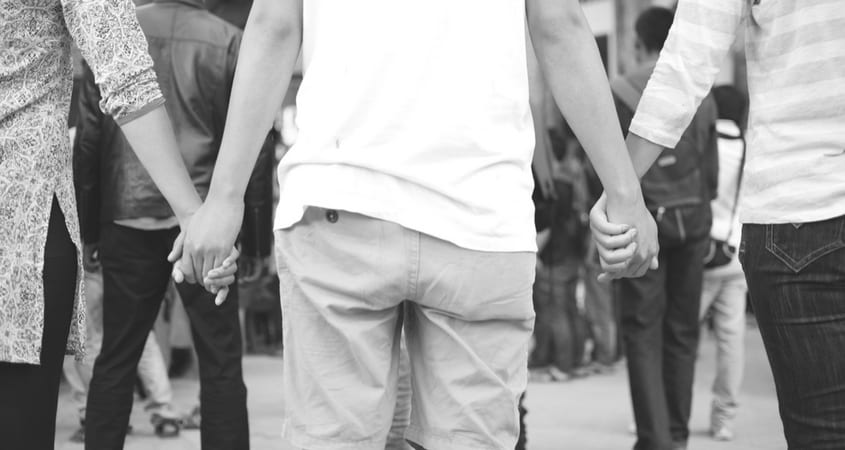
Reflect on the systems that seek to keep us from loving one another. Recognize that God’s own face is reflected in the faces of the marginalized of our society. God’s face is in a brown, Jewish carpenter’s, just as much as it is in the Black American woman’s, or in the forgotten American Indian’s, or in the faces of the family of color seeking asylum from violence and political unrest.
Find God in all things and all people—especially those racism seeks to divide us from through hate, discrimination, and systemic institutionalized oppression.
- Review how you used your white privilege today.
If a person of color was telling you their experience, did you listen with openness and compassion? Or did you argue, ignore, or interrupt?
In your place of work/service, did you use all available resources to make things culturally sensitive for your coworkers or clients, or did you assume American Western whiteness as the status quo?
Did you reflect on the land you stand on, or the rights you have that our justice system sees as racial privileges?
Did you speak up when a white friend/relative/coworker said or acted in a problematic way, or did you choose silence over action?
Allow yourself to remain present in all reflection—in the moments you are proud of your actions, but especially in the moments where you are not. Do not shy away from examples of your need and capacity for growth and love.
- Pay attention to your emotions.
In reflecting on how you utilized your privilege today, what are your feelings? Is there shame, anger, discomfort, fear, or hatred? Are there prejudices you hold that you are becoming aware of? Are there parts of your day where you felt confused, not sure whether something you said, did, or heard was problematic or oppressive?
However uncomfortable, sit with the discomfort; lean into it and begin to educate yourself from the actions of the day. Write down things you wish to learn more of, or journal about the challenges of allyship. Do not push away from your emotions – they are key in addressing white privilege and white supremacy.
- Choose one moment of the day where you used your privilege to either make or take space from people of color—reflect on that moment.
Find one moment from the day where you can find your white privilege at work in either an oppressive or just way. If it was something you are proud of, then take the moment to recognize and hold gratitude for the improvement and the opportunity you took to choose love and unity over divisiveness.
Pray for the courage, insight, humility, and self-awareness to continue to grow as a white ally for racial justice.
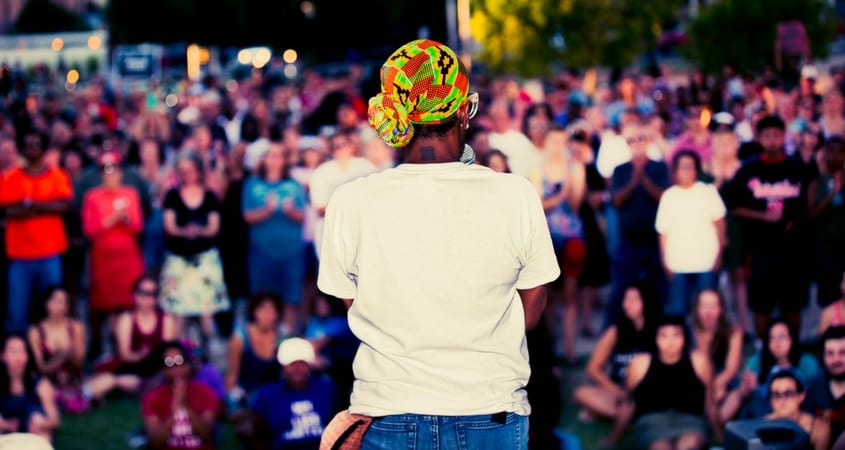
[Black Women Are Leading this Civil Rights Movement, Johnny Silvercloud via Flickr]
Pray for guidance, perseverance, and awareness for the future.
- Look forward to tomorrow.
Reflect on ways you can move closer towards allyship. Are there social justice groups or organizations asking for white allies that you can join or give support to? Are there books, articles, or other forms of media on race that you can turn to for education? Are there white folk in your life you may need to have uncomfortable conversations on race with?
Make conscious, practical, and intentional action plans to use your power to help dismantle racism. Be prepared to translate this spiritual work into concrete, physical actions. As St. Ignatius says, “Love is shown more in deeds than in words.”
Racism is a violence that manifests within minds, souls, actions, institutions, and systems—making itself a place within our history, present, and unfortunately in soon-to-be-seen ways, even our future. It is a penetrative, infectious violence that, even after years of social justice actions, protests, and victories, continues to persist. There is much to be done to resist and dismantle racism. Part of that as white folks is to make space within our moral and spiritual lives for continuous reflection, honesty, and self-improvement. It is on us to put in the work—physically, mentally, and spiritually—to educate ourselves and position ourselves to be better allies, and, most importantly, to help us love better. The root of racism is hate, and we are not called to hate, but to love.
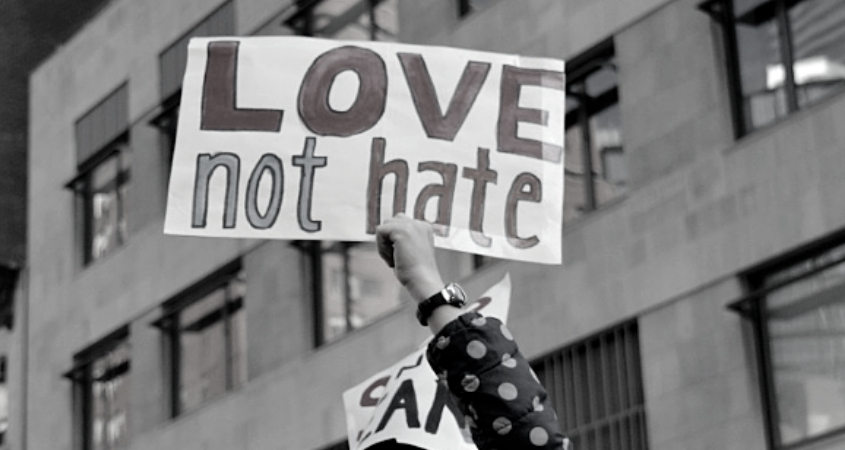
Today, I believe that, for white allies, love should like allyship: listening, humility, self-education, reflection, and consistent social justice action. It is hard work, but it is also essential work we all have the capacity to perform.
As the poet Rupi Kaur says in her book, “The Sun and Her Flowers”:
“To hate is such a lazy thing
But to love
Takes strength
Everyone has
But not all are
Willing to practice.”
[Editor’s Note: A slightly different version of this reflection was originally published in December 2018 as part of ISN’s JVReflects series, in partnership with Jesuit Volunteer Corps and Jesuit Volunteer Corps Northwest]
Maddie Murphy was a volunteer with Jesuit Volunteer Corps Northwest in 2017-2018, serving as the Community Support Coordinator at Wintonia Community Housing. She graduated from Fordham University and is from Wayzata, Minnesota.

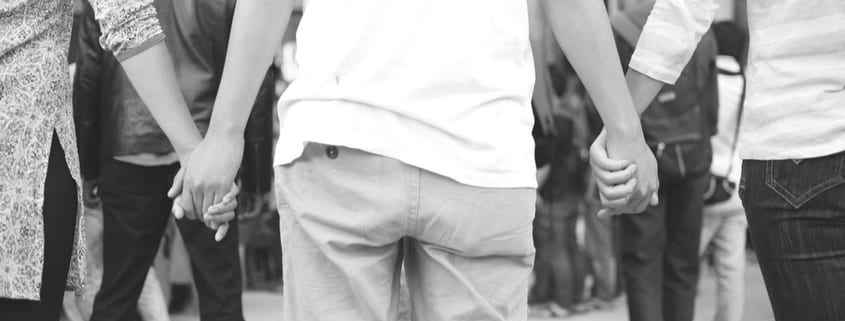


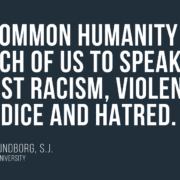

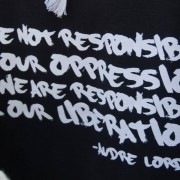
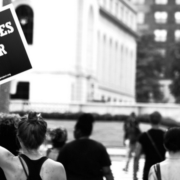


Thus wrote Mahatma Gandhi: “A small body of determined spirits fired by an unquenchable faith in their mission can alter the course of history.”
It is an unwarranted assumption that America is steeped in White Supremacy, and racist to insist that all whites have the advantage of “white privilege”. There are plenty of poor whites who are as economically, educationally, and sociologically disadvantaged as equivalent blacks. America’s culture of death, chaos is a rejection of Christian morality: racism & social unrest
is caused by a rejection of Christ and his gospel in an age that normalises & legalises fornication, no-fault divorce, artificial birth prevention, abortion, euthanasia, and sodomy.
When there are millions of violent murders in the womb, why be surprised when you have violence in the streets?
I find it disappointing that one writing as a graduate of St Agnes Academy does not draw upon Dominican spirituality, rather than to address perceived societal injustices through Ignatian (Jesuit) SWJ “social worker” approach to injustice. If rather than view sin through the lens of race, we instead view it through the necessity of working out our eternal salvation, and helping others do the same, we will avoid the Marxist distortion of “race-card games”, viewing each other as either oppressors or oppressed.
I am neither, and refuse the reductionist temptation to think that unachievable sociological and utopian goal of “equality” is going to win the war of good vs evil which will last to the end of time; and is caused by the world, the flesh, and the Devil.
On this earth there will always be injustice; Our Lord himself said “The Poor you always have with you”, meaning that the egalitarian ideal of the Socialist Utopia is unattainable on this earth. It is enough to work for Justice; if you do that, you will also accomplish “social” justice without having to “virtual signal” about race.
If you fulfil the duties of your personal vocation as a good (and counter-cultural) Catholic , you will be doing God’s, even as the world ridicules, and condemns you of for being Politically Incorrect.
What is Dominican spirituality?
Amen. Satan is sneaky. Critical race theory is obviously designed by our enemies to tear us apart as Americans. I am disgusted that the Jesuits or any TRUE Catholic would touch this Marxist filth.
And AMEN to you Dawn. CRT is dangerous. I see this as a way to further divide people and turn people into victims. As a white 72 yr old woman I don’t see anything in my life where I was given anything. I learned many things growing up in a family of 8 kids and now would not change a thing. I have had to earn everything along the way. I was not given anything & worked hard all my life and did not retire until I was 70. Hard work paid off and am truly blessed.
Satan is sneaky! Amen!!
You really shouldn’t tarnish the Jesuits in general because something like this slipped through. But obviously they could use a little Wisdom in what they put out here to avoid the scandal that some weak people might be misled.
These articles are getting worse and worse but you have the right to express an opinion although most is basically rehashed from others I’ve read all it’s missing is a apology. Assuming that a race has a privilege is racist that is the number 1 mistake that is made when trying to force this agenda, the only thing in this article that made any sense and is relevant is the need for education for everybody regardless of skin color/background not just one race. Maybe crime prevention would infact drastically decrease the chance of a interaction occurring in the first place. Titus 3:10-11 – As for a person who stirs up division, after warning him once and then twice, have nothing more to do with him, knowing that such a person is warped and sinful ; he is self-condemned.
Maddie, thank you for this creative and prayerful version of the Examen. White privilege is a reality. This reflection helps me undestand my white privilege and use it for justice not continued systematic harm toward people of color. Anytime we think, reflect, wonder in God’s presence, it’s powerful prayer.
Thank you.
Maddie, I was delighted to see a familiar name when I clicked on this in the most recent ISN email! Will keep this Examen in my toolbox. I hope you’re well, and that you and your family are staying safe and healthy. As they say ..Go rams!
Thank you for this helpful resource!! It offers a practical way for me to do the inner work necessary to dismantle my “Asian” privilege and implicit biases. Don’t be discouraged by the naysayers…I hope you will continue writing and speaking up.
This is a wonderful resource as it helps me to maintain a spiritual focus in the midst of this important time and work. I have one suggestion: when we pay attention to our emotions we should also be aware of and respond to positive emotions such as joy, satisfaction, and delight. As we do this spiritual work and prayer over time, these will arise and are also sources of insight into God’s actions and calls upon our lives. One small example: when I have an interaction with someone that builds relationship across some of these lines, God rejoices with me, and perhaps upon that reflection may be encouraged in moving forward.
Thank you for this modified examen. This prayer is so important during the season we find ourselves in. I admire your insight and activism, and I am grateful that you have shared this with us all!!
Obviously a young immature volunteer cannot be held to mature accounting of their words, but some more spiritually mature person should have moderated her comments on white privilege. Yes, at the time she wrote it, it was really trendy and popular in the secular world, but those facts should have raise red flags of caution to very carefully examine the theories of white privilege.
I’m “white” I guess (what is that anyway???) Really that’s the first deceptive label, but accepting it and the other loose category of “people of color” I can say that, yes, I have experienced racial discrimination several times in my life.
Since I was raised under the Christian mindset that race is meaningless, I had never looked at people through that lens, and still don’t. But I was made aware that other people certainly do!
When I was in 6th grade, in the Silverlake area of Los Angeles, I happened to walk past two 5th graders while on my way to the park to play basketball. The had positioned themselves at the entrance to the park, and as I started to walk by them, one called out to me, “Hey! Are you a GRINGO????” I capitalize it to emphasize that his tone was sneering and angry. I didn’t know what a gringo was. So I wanted to be sure that I understood him, so asked him to say it again, I hadn’t heard him. This time both boys said it loud and clearly, “Are you a GRINGO???” I paused, not knowing what that word was, but by the tone of their voices, it didn’t sound like I wanted to be that. So I said, “no.”
The next time was the next year when I was going with my best friend, Ernie Flores, to go visit his grandma in East LA. As we were driving up, I noticed a ravine down the street with some trees, and who knows, maybe a creek! So as soon as we got there, I took off down the street. A moment later, I hear Ernie running up behind me saying, “Bob! Stop!!” You can’t go down there by yourself! And I asked him why. And he told me, “because you’re WHITE” And I was offended!! I had a pretty good tan! So I told him, “hold out your arm.” And he did. He might have been darker than me by a half shade, but not much. And then he explained it to me.
And I’ve had other encounters like that in my life as well.
As far as “Indigenous people”, what is that ??? Aren’t we all children of Adam and Eve? Aren’t we all descended from Noah?? Is there any “people” that hasn’t been displaced from the land they occupied by some other people at some point in time??? We would do better to follow St Paul’s advice to the Galatians, 3:28.
We have a much better way. It’s called Jesus Christ. We should stick to preaching Him and not get trapped into the devil’s most recent lie iterations. Quit looking at and defining people by their “color” or lack thereof!!